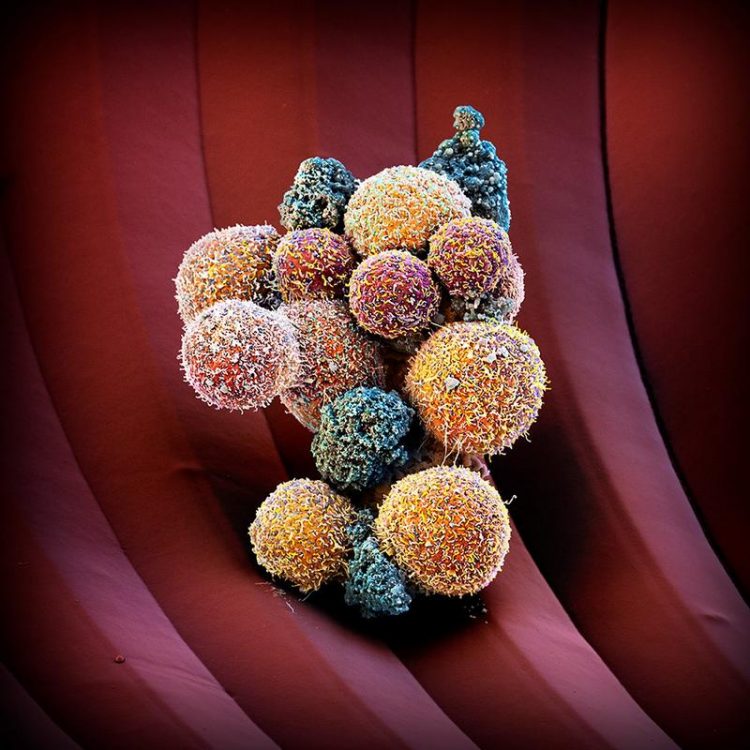Basel researchers identify drug against the formation of metastasis

The image represents an artistic coloration of a cluster of circulating tumor cells (CTCs), isolated from the blood of a patient with breast cancer, trapped on a microfluidic device. © M Oeggerli / Micronaut 2018, supported by Pathology-, C-CINA / Biozentrum-, and I Krol, and N Aceto, Faculty of Medicine-, University Hospital and University Basel.
The development of metastasis is responsible for more than 90% of cancer-related deaths, and patients with a metastatic disease are considered incurable.
The interdisciplinary team led by Prof. Nicola Aceto from the Department of Biomedicine at the University of Basel has identified a drug that suppresses the spread of malignant cancer cells and their metastasis-seeding ability.
Precursors of metastases: Circulating tumor cell clusters
Circulating tumor cells (CTCs) are cancer cells that leave a primary tumor and enter the bloodstream, on their way to seeding distant metastases. These so-called CTCs can be found in the blood of patients as single cells or cell clusters. CTC clusters are the precursors of metastases.
The Basel research team has discovered that CTC cluster formation leads to key epigenetic changes that facilitate metastasis seeding. These changes enable CTC clusters to mimic some properties of embryonic stem cells, including their ability to proliferate while retaining tissue-forming capabilities. The scientists have also shown that these epigenetic changes are fully reversible upon the dissociation of CTC clusters.
In their search for a substance that suppresses metastasis development, the research team tested 2486 FDA-approved compounds used for a number of different indications. They found inhibitors with the unexpected ability to dissociate patient-derived CTC clusters. This drug-based dissociation of CTC clusters into individual cells also resulted into epigenetic remodeling and prevented the formation of new metastases.
Preventing metastasis versus killing cancer cells
”We thought of acting differently from standard approaches, and sought to identify drugs that do not kill cancer cells, but simply dissociate them,” states Nicola Aceto, holder of an ERC starting grant and SNSF professorship.
In the fight against breast cancer, metastases remain the greatest danger. These new findings on the mechanisms of metastasis formation are the result of a large collaborative effort across various disciplines. “Our ambitious approach would not have been possible without collaboration with outstanding clinicians, molecular and computational biologists, with the support of state-of-the-art technology platforms,” says Aceto and adds: “Our methodology is positioned directly at the interface between these different disciplines. We are already working on the next step, which is to conduct a clinical trial with breast cancer patients.”
Further information
The accompanying image was chosen as cover story for the current issue of “Cell”. A workshop report on the production of the picture is available under this link once the embargo has expired: https://medium.com/sci-five-university-of-basel
Prof. Dr. Nicola Aceto, University of Basel and University Hospital Basel, Department of Biomedicine, phone: +41 61 207 0773, email: Nicola.Aceto@unibas.ch
Sofia Gkountela, Francesc Castro-Giner, Barbara Maria Szczerba, Marcus Vetter, Julia Landin, Ramona Scherrer, Ilona Krol, Manuel C. Scheidmann, Christian Beisel, Christian U. Stirnimann, Christian Kurzeder, Viola Heinzelmann-Schwarz, Christoph Rochlitz, Walter Paul Weber, Nicola Aceto
Circulating Tumor Cell Clustering Shapes DNA Methylation to Enable Metastasis Seeding
Cell (2018), doi: 10.1016/j.cell.2018.11.046
https://biomedizin.unibas.ch/en/research/research-groups/aceto-lab/
http://www.cancermetastasislab.com/
Media Contact
More Information:
http://www.unibas.chAll latest news from the category: Life Sciences and Chemistry
Articles and reports from the Life Sciences and chemistry area deal with applied and basic research into modern biology, chemistry and human medicine.
Valuable information can be found on a range of life sciences fields including bacteriology, biochemistry, bionics, bioinformatics, biophysics, biotechnology, genetics, geobotany, human biology, marine biology, microbiology, molecular biology, cellular biology, zoology, bioinorganic chemistry, microchemistry and environmental chemistry.
Newest articles

First-of-its-kind study uses remote sensing to monitor plastic debris in rivers and lakes
Remote sensing creates a cost-effective solution to monitoring plastic pollution. A first-of-its-kind study from researchers at the University of Minnesota Twin Cities shows how remote sensing can help monitor and…

Laser-based artificial neuron mimics nerve cell functions at lightning speed
With a processing speed a billion times faster than nature, chip-based laser neuron could help advance AI tasks such as pattern recognition and sequence prediction. Researchers have developed a laser-based…

Optimising the processing of plastic waste
Just one look in the yellow bin reveals a colourful jumble of different types of plastic. However, the purer and more uniform plastic waste is, the easier it is to…



